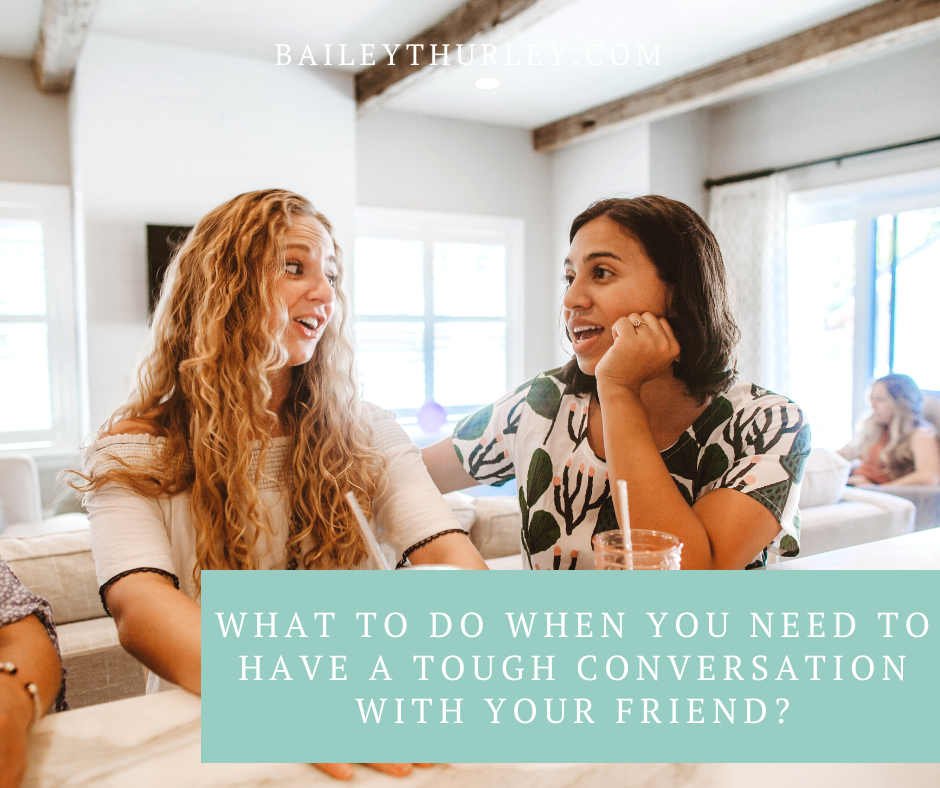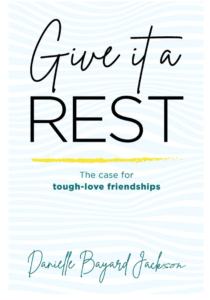It doesn’t need to be “Kardashian level” drama for friendship conflict to feel really tough. I shy away from conflict and hard conversations as much as possible because who wants to rock the boat?
Who wants to say something that may be difficult for a friend to hear?
Which one of you wants to call someone out when they have been gossiping about another girl?
And how hard is it to apologize to a friend when we know we’ve done something wrong?
My weakest are of friendship these days is “tough-love” friendship—being courageous enough to communicate my boundaries and speak difficult things to my friends.
“Tough-love” friendship is hard for all of us because we are afraid to lose the intimacy between friends.
Even in a marriage relationship, I know the disconnected, weird feelings that linger after conflict. And that is usually healthy conflict, when things have been shared and forgiveness has been given! In those moments our intimacy is in a strange limbo of hurt feelings and a desire to build trust again. In marriage I expect this conflict. It doesn’t feel so daunting even though it’s uncomfortable.
But in friendship, I expect things to be easier, less complicated. It catches me by surprise when unmet expectations or friendship failures need to be discussed.

The Opposite of Tough-Love Friendship: The Cut-Off Culture
In Danielle Bayard Jacksons’ book, Give It A Rest, she talks about the damaging effects of our cut-off culture.
“Cut off culture refers to the increasingly accepted practice of completely ending communication with someone without warning or explanation…We choose to ghost other women when we decide that moving forward would be too hard.” (p. 45).
This is the most common response I’ve experienced in my friendships when things are not as they should be—the silent treatment. Sometimes it lasts a few months until the conflict has been “forgotten” or sometimes it ends a friendship altogether. This is more painful than a difficult conversation would be. Having been on the receiving end, I can attest to how hurtful ghosting can be. It made me doubt my worth and second-guess all my friendships (does she really like me or will she disappear without any explanation too?). We don’t see this type of behavior in the Bible to suggest how to handle conflict. Here are just two examples:
If your brother sins against you, go to him and show him his fault. But do it privately, just between yourselves. If he listens to you, you have won your brother back. (Matthew 18:15)
If someone has done you wrong, do not repay him with a wrong. Try to do what everyone considers to be good. Do everything possible on your part to live in peace with everybody. (Romans 12:17-18)
So How Do We Seek Healthy and Hard Conversations in our Friendships?
Give it a Rest is a complete guide for “tough-love friendships” and provides a model for how to communicate with your friends in conflict. This book gives a lot of specific examples and tools to seek peace and build confidence to approach friends. This book has inspired this post and I highly recommend purchasing it as she covers this topic more in-depth. But some quick tips from the author herself:
Check your insecurities and how they may affect the way you receive a “tough-love” word from a friend
You are secure in Christ, there is nothing you need to do to gain his love or acceptance. That being said, check your insecurities and try to understand that your friend is approaching you out of love. If it doesn’t feel genuine, then maybe ask your friends some follow up questions to clarify why she is having this tough conversation.
Find the right time and place to talk
Don’t bring it up in front of your entire small group or in the conference room in front of everyone at work. Be kind. Treat others how you would want to be treated so find an appropriate time or place to talk.
Cover the conversation in prayer
Bring the conversation before God and ask for His strength to listen, forgive, understand, and reconcile.
Approaching a friend on sensitive subjects is awkward but it is our duty to talk through disappointments, concerns and expectations for the growth of our friendships. Instead of sitting alone with your thoughts (or complaining to another friend) when a friend falls short; ask God for the boldness to love them in the tough conversations. To read more #rootedcommunity tips on handling conflict in friendships, click here.
You can purchase Danielle’s book here and also find her website here.







I have a friend who is the opposite of me in terms of the way we were brought up and the way we live and show love which is what brought me here . Recently she has made me question her trust because she shared information I specifically asked her not to. And in turn caused unnecessary drama that affected my family. Then another instance she has taken things I have said and twisted them. And a few other things since then(left me after inviting me to go out, and breaking a promise to my daughter) This because of my long line of hurts (and insecurities) caused me to draw back and Go into self preservation mode. She approached me about why I was acting different and I told her and let her know specifically why those things hurt me. She never owned up to any of it and offered me very rigid advice and “tough love”. I just can’t see her heart being in a good place, I feel like a one sided friendship and I feel like I let her in and she hurt me. I’m hoping this book is a way to help me understand tough love because it’s just not my language. I hoped she would reinforce my worth instead of saying “insecurities can only be fixed by you” and “you’ve got to give yourself more self wort than that” . My heart is broken! All I need is a hug and her to pour into me . And show me that she cares. Recently she sent me a article that was titled “you can be pitiful or you can be powerful” but you can’t be both and talks about John 5 when the man laid sick for 38 years.
I’m offended. I’m hurt and just need guidance to see and hear God!
Absolutely! This is a really tough situation and friendship hurt can be the hardest hurt to walk through. I am always available as a coach but want to just let you know friends should be a safe place to be yourself. This reads all red flags to me.
These conversations are hard but can also move the relationship to be even stronger!
You are so right!